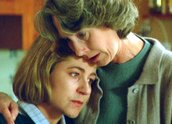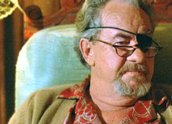


Travelling North (1987)
Synopsis
After retiring, Frank (Leo McKern) and his new companion Frances (Julia Blake) leave Melbourne to begin a new life in Port Douglas, in far north Queensland. He’s an irascible ex-communist civil engineer; she’s a sweet-tempered woman who believes in God and politeness. Her two daughters – Sophie (Diane Craig) and Helen (Michele Fawdon) – are concerned that widower Frank is using her; Frank worries about keeping her. Their new home is idyllic, an airy tropical bungalow overlooking the sea. Frank loves fishing and music and isolation, but he learns to tolerate their nosy neighbour Freddie (Graham Kennedy). Frank is blissfully happy, until his new doctor Saul (Henri Szeps) diagnoses heart disease. Frances is less content, with nothing to do and her children and grandchildren a long way south. Returning reluctantly for a visit to Melbourne, Frank has a heart attack. Frances brings him back to Port Douglas to recover, but he becomes ever more tyrannical. She leaves him and returns to Melbourne. Full of remorse, Frank apologises and asks her to marry him. They begin their new life again but there is little time left. Frank dies in an armchair listening to music. Frances, Saul and Freddie toast his memory with the champagne he always kept in the fridge for the purpose.
Curator’s notes
Travelling North was a biographical play for David Williamson, rather than autobiography, in that it was based on the experiences of his mother-in-law. In a 1995 television documentary (Tall Tales But True: David Williamson, Playwright) Williamson told Don Featherstone that the inspiration came from seeing his wife’s mother Hope, in her relationship with a man called Wilkie. 'Wilkie was fiercely intelligent and did not suffer fools gladly, a very impressive man, an ex-communist, and she was softer, warmer – but troubled. I was impressed by her compassion in helping him face death. But it was more difficult for Hope, and for my character Frances in the play, in some senses, because she was a woman, and women are often cast into the role of emotional specialists. Coping with emotional problems, she (Frances) was forced to cope with Frank’s problem, which is imminent death, and her daughters’ problems. Both of her daughters were going adrift and so they needed their mother around’.
The play is one of Williamson’s earliest to deal with issues of family and responses to death. If most of his earlier plays of the 1970s are primarily about men in their public worlds – Stork (1971), The Removalists (1975), Don’s Party (1976), The Club (1980) – Travelling North is more open to the voices of women in their more private worlds. In a simplified sense, it’s about a man who takes and a woman who gives – but there’s nothing puny or petty about Frank. We can believe that this woman would fall in love with this man, because he’s so large in spirit and ambition, even as a man entering retirement. Leo McKern’s performance suggests that a life lived in opposition has made him harder and gruffer than he wants to be. The move to the north is his attempt to get away from that man he once was – albeit doomed to fail. The Melbourne scenes make clear that his own daughter doesn’t figure strongly in his thinking, even though he loves her, and that his son (whom we never see) despises him. The pull of family is stronger for Frances, even if she also feels some ambivalence towards her two daughters (no wonder, given that Helen, Michele Fawdon’s character, is such a needy and accusing presence).
The play premiered in 1979, the year that David Williamson moved from Melbourne to Sydney, a significant event in both his personal and professional life. It may be that Travelling North reflects, even if indirectly, his own desire for a new start in a new city. It might even be that the play is in some sense his farewell to Melbourne, at least in an emotional sense. The film was not made until eight years later, with Williamson adapting his own play into a script. The director, Carl Schultz, had had a major critical success in 1983 with his adaptation of Careful, He Might Hear You, and he brought to the new film a little of the same brittle emotionalism.
The casting of Leo McKern was a coup, because he almost never accepted roles in Australia, even though he was born in Australia. He had become a major character actor in theatre and film in England, after moving there in 1946, aged 25. He was best known in Australia as the portly barrister Horace Rumpole, from a highly successful British TV series of the early 1980s, but he did not like flying, so he rarely returned to Australia. This role won him the AFI award for Best Actor in 1987. Williamson also won the AFI Award for Best Adapted Screenplay. Julia Blake was nominated, but missed out, although this is certainly one of her best performances.
- Overview
- Curator’s notes
- Video 3 clips
- Principal credits
- Find a copy
- Comments 1
- Map
- Add your review



